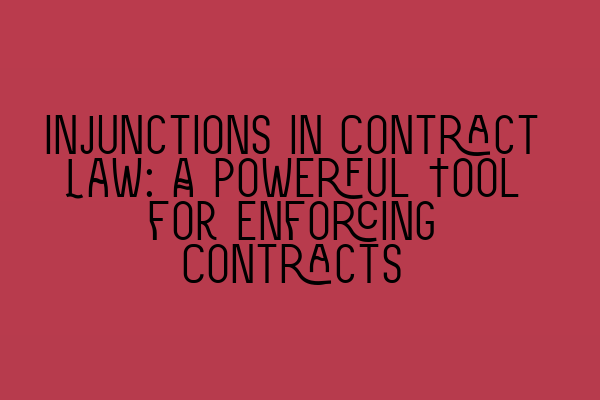Injunctions in Contract Law: A Powerful Tool for Enforcing Contracts
Contracts are the lifeblood of business transactions, providing legal enforceability and mutual obligations between parties. However, despite the best intentions, disputes can arise. In such cases, it is essential to have effective remedies to enforce contracts. One powerful tool in the legal arsenal is the injunction.
What is an injunction?
An injunction is a court order that compels a party to do, or refrain from doing, a specific act. In the context of contract law, injunctions can be used to enforce contractual obligations, prevent breaches, and protect the rights and interests of the parties involved.
Types of injunctions
There are various types of injunctions that can be sought in contract law, depending on the circumstances and desired outcome. Some common types include:
1. Mandatory Injunctions: These injunctions require a party to perform a specific act or obligation. For example, if a party has failed to deliver goods as agreed, a mandatory injunction may be sought to compel them to fulfill their contractual obligations.
2. Prohibitory Injunctions: These injunctions prevent a party from taking certain actions or engaging in specific conduct. For instance, if one party is threatening to disclose confidential information in violation of a non-disclosure agreement, a prohibitory injunction can be sought to restrain them from doing so.
3. Interlocutory Injunctions: Also known as temporary or interim injunctions, these are sought during ongoing legal proceedings to provide immediate relief. Interlocutory injunctions are usually granted when there is a serious question to be tried and the balance of convenience favors granting the injunction.
The power of injunctions
Injunctions can be incredibly powerful tools for enforcing contracts. They offer parties a way to preserve their rights and prevent irreparable harm that monetary damages alone may not adequately address. By seeking an injunction, a party can:
1. Prevent Breaches: Injunctions can stop a party from breaching a contract or engaging in conduct that would violate the contractual terms. This ensures that parties uphold their obligations and honors the sanctity of the contract.
2. Protect Confidential Information: Businesses often rely on confidentiality agreements to safeguard their trade secrets and sensitive information. Injunctions can be sought to prevent the unauthorized disclosure or use of such information, ensuring that valuable assets remain protected.
3. Preserve Property Interests: Injunctions can be used to protect property interests, especially in cases where there is a risk of irreparable harm or loss. For example, if one party is threatening to sell a valuable asset that is subject to a contractual dispute, an injunction can prevent the sale until the matter is resolved.
4. Maintain the Status Quo: Injunctions can preserve the status quo by preventing parties from taking actions that would alter the circumstances or unfairly advantage one party over another. This is particularly important when contracts are being renegotiated or disputes are being resolved.
Seeking an injunction
To obtain an injunction, certain criteria must be met. The party seeking the injunction must be able to demonstrate the following:
1. A Serious Issue to be Tried: The party must establish that there is a serious question or issue that requires judicial determination. This means that the claim or dispute must have merit and be capable of being resolved through legal proceedings.
2. Irreparable Harm: The party must demonstrate that they will suffer irreparable harm if the injunction is not granted. This means that the harm cannot be adequately compensated through monetary damages and that the injunction is necessary to prevent further damage.
3. Balance of Convenience: The court will consider the balance of convenience and determine whether it is fair and just to grant the injunction. Factors such as the potential harm to both parties, the public interest, and any other relevant circumstances will be considered.
It is important to note that injunctions are discretionary remedies, meaning that the court has the power to decide whether or not to grant the injunction based on the specific facts and circumstances of each case.
In conclusion, injunctions are a powerful tool in contract law for enforcing contracts, preventing breaches, and protecting the rights and interests of the parties involved. By seeking an injunction, parties can ensure that their contractual obligations are upheld, and irreparable harm is prevented. If you are involved in a contract dispute, it is essential to consult with a qualified solicitor who can provide expert advice and guide you through the injunction process.
Related Articles:
– [SQE 1 Practice Exam Questions](https://fqps.co.uk/sqe/sqe1-preparation/mcq-practice-quiz)
– [SQE 1 Practice Mocks FLK1 FLK2](https://fqps.co.uk/sqe/sqe1-preparation/practice-mocks-quiz)
– [SQE 2 Preparation Courses](https://fqps.co.uk/sqe/sqe2-preparation)
– [SQE 1 Preparation Courses](https://fqps.co.uk/sqe/sqe1-preparation)
– [SRA SQE Exam Dates](https://fqps.co.uk/sqe/sqe1-sqe2-exam-dates)
